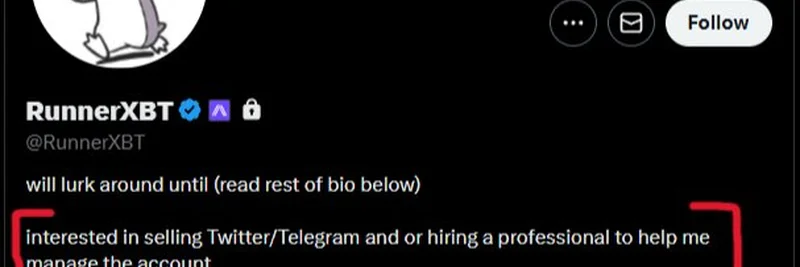If you’ve been scrolling through X lately, you might have stumbled upon a fascinating thread from @CryptoTaxSucks about RunnerXBT, a popular account with over 92K followers, putting their Twitter handle up for sale. The post, shared on August 11, 2025, highlights an intriguing twist: selling your online identity isn’t just a simple transaction—it could have big tax consequences. Let’s break it down in a way that’s easy to digest, especially if you’re into meme tokens or blockchain trends!
Why Selling a Twitter Account Matters
RunnerXBT’s bio casually mentions they’re “interested in selling Twitter/Telegram and or hiring a professional to help me manage the account.” With a join date of May 2007, this account has been around for nearly two decades, building a valuable following. But here’s the kicker: the IRS (Internal Revenue Service) doesn’t see this as just a casual sale. They treat it like selling a digital asset, similar to a domain name or even cryptocurrency.
For most people, selling an account might seem like a quick cash grab—a DM, a handshake, and you’re done. But the tax angle changes everything. Depending on how the IRS classifies the sale, you could be looking at either capital gains tax or ordinary income tax. The difference? It could save or cost you thousands of dollars.
Capital Gains vs. Income Tax: What’s the Deal?
Let’s simplify this. If the IRS treats your Twitter account as a capital asset (like a stock or property you’ve held for a while), you’ll pay capital gains tax. This is great news if you’ve owned the account for more than a year—known as a long-term capital gain. In 2025, the rates are:
- 0% if your income is below $48,350 (single) or $96,700 (married)
- 15% for incomes between $48,350–$533,400 (single) or $96,700–$600,050 (married)
- 20% for anything above that
Since RunnerXBT joined in 2007, they’ve likely held the account for over a year, qualifying for these lower rates. Imagine selling for $800,000 with a $0 cost basis (you didn’t pay to create it). That’s an $800,000 gain, but at 20%, you’d owe just $160,000 in taxes. Not bad!
Now, contrast that with ordinary income tax, which can hit up to 37% for high earners. On that same $800,000, you’d owe $296,000—a difference of $136,000! The classification makes a huge impact.
The Catch: It’s Not Always So Simple
Here’s where it gets tricky. If RunnerXBT used the account for business—like monetizing with brand deals or flipping accounts like inventory—the IRS might classify it as ordinary income instead. That bumps the tax rate way up. It all depends on how the account was used and how long it was held.
Another cool twist? If you spent money growing the account (think ads, contractors, or content costs), those expenses can increase your cost basis. A higher cost basis means a lower taxable gain. But here’s the catch—most people don’t keep those records, so they miss out on this tax break.
Offsetting Losses with Crypto
If you’re deep into the meme token world (like the MELANIA token trending at $0.2284, as shown in the thread), you might have some crypto losses to offset this gain. Say you lost $100,000 on a bad token bet. You could subtract that from your $800,000 gain, leaving a $700,000 taxable amount. At 20%, that’s $140,000 in taxes—even better!
What This Means for You
Selling your online persona, whether it’s a Twitter handle or a Telegram group, is more than just a meme-worthy move. It’s a digital asset sale, and the IRS is watching. For blockchain enthusiasts or meme token traders, understanding these tax rules can save you a ton of money. If you’re thinking about selling your account, ask yourself: What’s your price? $100,000? $500,000? More?
For now, RunnerXBT’s move has sparked a conversation, and @CryptoTaxSucks is breaking it down with some solid insights. Keep an eye on meme-insider.com for more updates on how meme culture and blockchain tech intersect with taxes and beyond!

